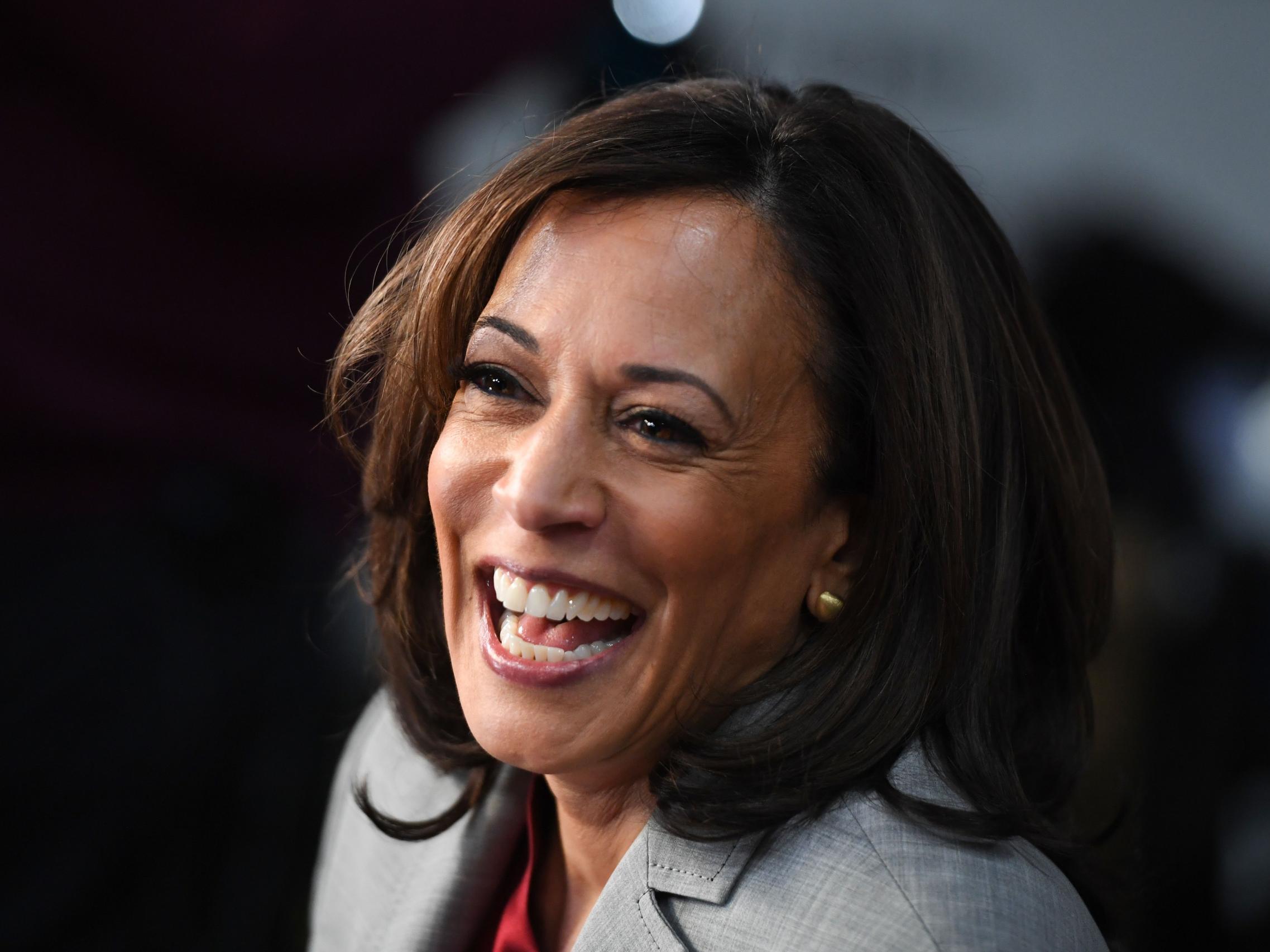Kamala Harris' legislative record is about as liberal as it gets in the Senate
Analysis: Despite nearly four years of mostly unflinching liberal purity in the Senate, VP hopeful still can’t seem to shake questions about her career as a California prosecutor and attorney general, US political correspondent Griffin Connolly writes


Senator Kamala Harris has spent the last three and a half years in Washington cultivating one of the most ideologically pure liberal records of anyone not named Bernie Sanders.
From flagship Democratic bills she has helped author on policing reform and environmental regulations to her voting record on North American trade and Donald Trump’s political and judicial appointments, Ms Harris has aligned herself with the principal liberal thrust of the Democratic party.
The California freshman, who was tapped last week to be Democratic presidential nominee Joe Biden’s running mate this fall, has voted with Democrats more than 99 per cent of the time since taking office, according to several different metrics, including the CQ Party Unity score.
Ms Harris was one of just 14 Democratic senators in 2017 and 10 in 2018 to receive a perfect voting score from the liberal watchdog group Americans for Democratic Action.
In a video released shortly after Mr Biden’s announcement last week, the Trump campaign branded Ms Harris “the most radical nominee for vice president in American history.”
Yet after nearly four years of mostly unflinching liberal purity, she still can’t seem to exorcise the ghosts of her career as a California prosecutor and attorney general, where, progressives argue, she was too harsh on non-violent criminals and too supportive of current policing norms.
“There's some concern about her law enforcement record,” said Amy Steigerwalt, a professor of political science at Georgia State University, who noted that while Ms Harris has taken a leading role among her colleagues on policing and criminal justice reform since arriving to the Senate in 2017, her past decisions at the state level — such as criminally punishing parents for their children’s truancy at school — have left some observers questioning her overall legislative sincerity.
Here is a more granular look at the senator’s record issue by issue:
The economy
Being the minority party in Congress has a remarkable way of fostering ideological unity, and Ms Harris was one of the least likely Democratic senators to stray on the economy.
Along with every other Democrat, she voted against the 2017 Republican tax code overhaul that provided breaks across the board for high- and middle-income families but added trillions of dollars to the national debt.
As a presidential candidate in May 2019, Ms Harris called for the full repeal of that law — its tax breaks for the wealthy, corporations, and middle class earners alike.
“Get rid of the whole thing,” Ms Harris said after a campaign event in Detroit, her position marking a distinct departure from other Democratic presidential hopefuls who supported the GOP law’s middle-class tax breaks but opposed lowering the corporate tax rate and giving breaks to top earners.
Senator Kirsten Gillibrand of New York, another staunch liberal, for instance, had called for cementing the middle-class tax cuts but rolling back the law’s corporate rate reduction, putting those savings towards child tax and earned income credits.
The coronavirus crisis introduced a whole different ballgame for economic legislating, and Ms Harris has been, again, one of the most liberal proponents of harnessing — and creating — government welfare programmes to ease financial burdens for Americans.
The pandemic has even led her to embrace measures mirroring Andrew Yang’s universal basic income proposals for as long as Covid-19 continues to keep the US economy in the pits.
In May, Ms Harris teamed with Mr Sanders and Massachusetts Senator Ed Markey to introduce the so-called Monthly Economic Crisis Support Act that would give nearly every American adult $2,000 per month for the duration of the pandemic, until the economy reached certain unemployment benchmarks.
That legislation aligns her more with the policy proposals of the Congressional Progressive Caucus than with moderate Democrats who, while proposing robust stimulus check programmes, have been willing to compromise with Republicans on more modest deals.
“We [can’t] just have that one-time check of $1,200 through the course of this crisis,” Ms Harris said in an interview with MSNBC in July.
“We need to give people $2,000 a month as recurrent payments,” she said.
Foreign policy
International relations is one major policy arena where Ms Harris has departed at times from the positions of most of her Democratic colleagues. Though, overall, she can still be fairly pegged as an adherent to the establishment foreign policy tradition.
On multiple key votes she has shown a preference for anti-interventionism in the Middle East, at times positioning her alongside her Democratic colleagues, at other times not.
Ms Harris voted against a bipartisan national security resolution in February 2019 condemning Mr Trump for his threat to draw down US forces in Syria and Afghanistan.
While she spoke out against the abrupt decision-making and lack of coordination with his military and national security advisers, her vote signalled she agreed with the president that the US ought to cut its losses and reduce its military footprint in the region — a position that bucks the bipartisan, establishment tradition of US foreign policy’s so-called school of “realism.”
Climate crisis
Ms Harris was one of just eight Democratic senators to vote against the bipartisan US-Mexico-Canada Agreement (USMCA), Mr Trump’s signature free trade pact that built in more protectionist clauses than its more neoliberal predecessor, the North American Free Trade Agreement (NAFTA).
But her reasons for voting against the bill weren’t the populist propensities that informed other liberals’ opposition.
The California senator said at the time that while the USMCA improved the overall lot of American workers, its environmental provisions were “insufficient.”
“By not addressing climate change, the USMCA fails to meet the crises of this moment,” she said in a statement that encapsulates her climate hawkishness.
Ms Harris will have to reckon with her past statements opposing hydraulic fracturing, which Democrats and some energy industry experts call an environmentally unfriendly method of extracting natural gas that composes key sectors of the economies of Pennsylvania and Ohio, two swing states that Mr Biden has his eyes on this November. Add Texas to that list, with Mr Trump again on Monday mocking her view and saying she will prove unpopular and a burden to Mr Biden in those crucial battlegrounds.
During her ill-fated presidential run, Ms Harris mostly dodged questions about whether the US government ought to break up big tech companies like Facebook and Google, an essential campaign talking point of Massachusetts Senator Elizabeth Warren.
When she couldn’t avoid the issue, she tried pivoting towards talking points about legislation she had co-sponsored, bills aimed at protecting Internet data privacy, using that record as a useful escape route.
Ms Harris has parochial interests to consider on Big Tech, hailing from Northern California, home to many Silicon Valley tech industry giants.
“It’s reasonable to expect a senator from California to look out for the interests of Silicon Valley. Lots of jobs are at stake,” said Jim Manley, who worked for retired Senate Democratic leader Harry Reid for six years and has observed Ms Harris’ tenure.
Her position puts her mostly in lockstep with Mr Biden, if you read between the lines on what both of them have said.
Breaking up the Facebook monolith is “something we should take a really hard look at,” Mr Biden said in a January interview with the New York Times, though he said such a move would be “premature” for now.
Law enforcement
As one of just two black Democratic senators, Ms Harris was a chief author of the chamber's version of a robust policing reform bill that went nowhere in Republican Mitch McConnell’s Senate but passed in the Democratic-controlled House.
She does not support defunding the police — no congressional Democrat has explicitly supported that mantra, though they have sympathised with the sentiments underlying the movement and have adopted policy positions to demilitarise the police.
That bill, named for George Floyd, who died in May while being detained by police in Minneapolis, would fundamentally alter “qualified immunity” laws to make it easier to sue police and other government agencies for misconduct, a proposal the current administration vehemently opposes.
The Democrats' bill would also change the language of section 242 of title 18 of the US criminal code to make it easier to prosecute law enforcement officers for misconduct, another non-starter for Republicans.
Ms Harris’ bill would provide monetary incentives to state and local police departments to ban choke holds and no-knock warrants for drug cases.
Those policy ideas will have to remain just that — ideas — as long as Republicans maintain some sort of legislative negotiating power.
Democrats could not even reach a starting point for negotiations with Republicans this summer on policing reform, ideological differences driving a wedge between the parties at a moment when many thought they might come together on, well, something.
Join our commenting forum
Join thought-provoking conversations, follow other Independent readers and see their replies
Comments
Bookmark popover
Removed from bookmarks